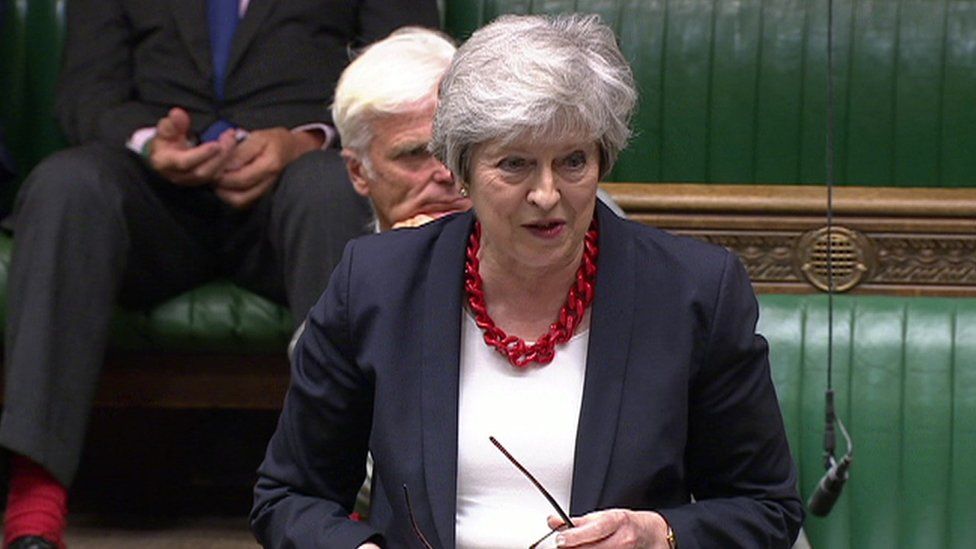ARTICLE AD BOX
 Image source, UK Parliament
Image source, UK Parliament
By Becky Morton
Political reporter
Former PM Theresa May has said backing a report that found Boris Johnson deliberately misled MPs would help restore people's trust in Parliament.
A cross-party committee found Mr Johnson committed repeated offences when he said Covid rules had been followed at No 10 at all times.
Mrs May was one of several senior Conservatives who said they would vote in support of the report's findings.
But allies of Mr Johnson questioned the impartiality of the committee.
The Privileges Committee of MPs, which has a Conservative majority, was asked to investigate whether Mr Johnson misled MPs over what he knew about parties held in Downing Street during Covid lockdowns - dubbed the Partygate scandal.
Its report concluded that Mr Johnson made multiple deliberately misleading statements to Parliament about events at No 10.
Ahead of the report's publication, Mr Johnson announced he was quitting as an MP, branding the committee a "kangaroo court".
The committee found Mr Johnson had committed further "contempts" of Parliament by attacking the committee, increasing the severity of the recommended sanction.
The committee subsequently recommended a 90-day suspension for Mr Johnson - a long ban by recent standards - as well as denying him a parliamentary pass, which he would normally be entitled to as a former MP.
If he had still been n MP and this was approved by the Commons, this could have triggered a by-election in his constituency.
MPs are due to vote on the report's findings later.
Speaking during a Commons debate ahead of the vote, Mrs May said backing the report would be "a small but important step in restoring people's trust" in Parliament.
It was "important to show the public that there is not one rule for them and another for us", she said.
"This committee report matters. This debate matters. And this vote matters,
"They matter because they strike at the heart of the bond of trust and respect between the public and Parliament that underpin the workings of this place and of our democracy."
Mrs May urged her fellow MPs to vote in support of the report "to uphold standards in public life, to show that we all recognise the responsibility we have to the people we serve, and to help to restore faith in our parliamentary democracy".
Prime Minister Rishi Sunak did not attend the debate and has refused to say how he would have voted, suggesting he did not want to influence others.
Opposition parties, who have said they support the reports conclusions, have urged Mr Sunak to show leadership by voting.
Rishi Sunak is asked several times if he will take part in Boris Johnson Partygate report debate and vote in the Commons.
Supporters of Mr Johnson spoke out against the report's findings.
Lia Nici, who was Mr Johnson's parliamentary private secretary, told MPs she could not see any evidence he had knowingly misled Parliament.
She questioned the impartiality of the committee and suggested the process was "political opportunism" for people who did not like Mr Johnson.
Former minister Jacob Rees-Mogg, who was knighted by Mr Johnson in his resignation honours, described the proposed 90-day suspension as "a vindictive sanction".
In response to accusations some Johnson allies had attempted to discredit the committee's work, Mr Rees-Mogg said it was "absolutely legitimate to criticise the conduct of a committee" and its members.
However, the committee's chairwoman, Labour MP Harriet Harman, said its members had to "withstand a campaign of threats, intimidation, and harassment designed to challenge the legitimacy of the inquiry".
She defended her impartiality, after Mr Rees-Mogg referenced her previous tweets criticising Mr Johnson, saying she had offered to step aside as chairwoman after the tweets emerged but she said she was assured by the government she should continue in her role.
Watch: Harriet Harman answers Jacob Rees-Mogg who raises her "famous tweets" about Boris Johnson
After the debate, there could be a recorded vote or MPs could simply nod the report through, unless the result is not obvious. If there is a vote, it is expected to pass easily.
It would be a free vote for Tory MPs, meaning party managers - known as whips - will not instruct them how to vote.
Commons Leader Penny Mordaunt, who opened the debate, said she would vote in support of the report, adding: "The integrity of our institutions matter."
However, she said "all members need to make up their own minds and others should leave them alone to do so".
Mr Johnson has asked his supporters not to vote against the report, with sources close to the former prime minister arguing it has no practical effect now he has resigned. Instead, some are likely to abstain or not turn up to take part.
A formal vote could be divisive for the Conservative Party, with any Tories who vote for the report likely to provoke anger from Mr Johnson's supporters.

 1 year ago
28
1 year ago
28








 English (US) ·
English (US) ·